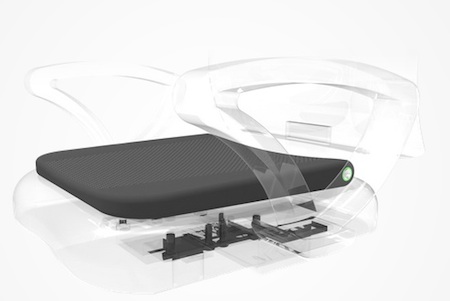 Digital health upstart Darma has developed a cushion that aims to help people remember to maintain good posture when sitting down for long periods of time.
Digital health upstart Darma has developed a cushion that aims to help people remember to maintain good posture when sitting down for long periods of time.
The cushion contains one millimeter-thick fiber optic sensors that sense the user's movements. The pillow also has embedded sensors that detect heart rate, stress level, and respiration. All of this information is sent to a companion app on the user's smartphone. The app can then track a user's stress level, sitting time, and posture and try to motivate users to get up every now and then. It will also alert users when they've slipped into a bad position and explain how to correct the posture. If users are feeling back pain, the app can guide them through stretches that might help relieve it.
Darma expects the cushion to retail for $249, but plans to launch a Kickstarter soon and sell the product for $149 to early backers, according to a report in TechCrunch. The Darma team also told TechCrunch they plan to eventually use this fiber optic technology in a new product that would measure how well users sleep.
While only few companies have brought posture-tracking products to market, the most well-known is Lumo Body Tech, maker of a app-connected posture sensing belt, others have explored way to motivate people who sit too much to get up and move.
An app framed with employee wellness in mind, called Hotseat, uses social motivation — users sharing and challenging other users — to get office workers to engage in a bout of mini-activity during 2-minute work breaks. Workers choose from a menu of activities, including walk and climb steps, and the app will alert them to break and do their chosen activity or activities throughout the day. The app also integrates the user’s calendar so it can create a daily activity break calendar that fits the user's schedule.
Another company started an Indiegogo campaign in November to raise funds for its device, called Rise. The device is kept in the user’s back pocket and simply tracks how much a user sits throughout the day. The device then sends these metrics to a companion app. The campaign raised $8,346 of its $80,000 goal.
Recently, activity tracker Fitbit announced a partnership with Stir, maker of the Stir Kinetic Desk. The desk moves up and down as it learns from the user’s behavior. Users can command the desk to move by tapping on a touchscreen sensor in the corner of the desk. Throughout the day, Stir might also slightly sway up and down while the user is working to remind users to move around.
















